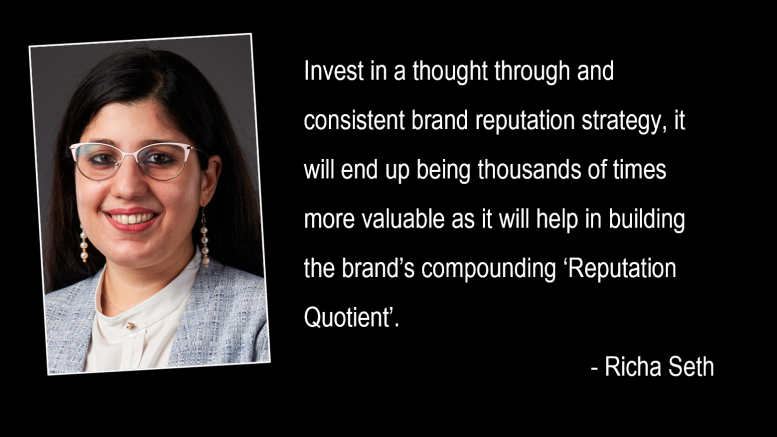Did you know, 87% of C-Suite executives rated reputation risk as more important than other strategic business risks stated a recent global survey done by Deloitte.
As we all are witnessing and reading about the upcoming global recession, mass layoffs at some of the global IT companies, CEO and Employee activism on social media, we are also seeing a significant impact of these developments on brand’s overall reputation. Moreover, social media has empowered employees, customers, partners and other stakeholders as a media house in themselves, blogs and some of the online news portals also carry fake news with malicious intent. Such fake news can tarnish the reputation of any brand.
According to a study by the World Economic Forum, on an average more than 25% of a company’s market value is directly attributable to its reputation. Considering that a brand’s ‘Reputation’ can have the biggest impact on its revenue and brand value, it becomes imperative to have a planned and robust communications strategy in line with the business goals of the brand.
- Make Strategic Communications the foundation for all Business Priorities: If the organisation is investing in Technology at the manufacturing plant/simplifying processes or committing to the ESG goals, making investments to combat cyber security threats or training its employees to be future ready. It becomes imperative to communicate about these initiatives through appropriate media that reaches out to the relevant target audience at the right time. For instance, if the global media discussion is about COP27 – a global conference where world leaders meet to discuss climate negotiations and global energy crisis, it would be appropriate to share a detailed ESG report on how your company will be meeting the sustainability goals.
- Build your own Internal and External Influencers: Brand can always build its reputation through testimonials from third-party such as clients, partners, employees or community. Getting them to share your story about how the brand is working on net zero goals or giving back to the community by making investments that have yielded phenomenal socio-economic impact adds a lot of credibility and makes the story very trustworthy.
- Crisis Management Strategy: Being a responsible organisation, one should have a crisis manual with all possible issue/crisis scenarios with an appropriate response as a playbook. Apart from this, companies should also work on a response mechanism/process to ensure that an appropriate response is shared during any untimely issue/crisis.
- Building a Positive Safety Net: Companies should continue sharing milestones that include certifications from renowned regulatory authorities regarding ESG, Safety or Great Place to Work, this helps to create a positive ‘safety net’ that reduces negative impact of any potential issue. Additionally, sharing client testimonials through industry stories, video testimonials on social media and company owned platforms also goes a long way in building long-term relationships with the client.
- Empathetic and Optimistic Employer Brand: Internal employees are one of the key stakeholders for any brand, it becomes imperative for any brand to be very transparent and communicate about business developments such as revenue, profit/loss, new product developments, shift in business strategies and the role that the employees will be playing to drive the growth of the company. In case businesses are planning any retrenchments then it should be empathetically communicated and a planned outplacement solution should also be provided to the employees who have been impacted.
To quote from an interesting book ‘The Almanack of Naval Ravikant’, “Compound Interest also happens in your reputation, if your brand has a sterling reputation and you keep building it for decades, people will notice.”
Invest in a thought through and consistent brand reputation strategy, it will end up being thousands of times more valuable as it will help in building the brand’s compounding ‘Reputation Quotient’.
The views and opinions published here belong to the author and do not necessarily reflect the views and opinions of the publisher.



Be the first to comment on "India Inc. building a compounding Reputation Quotient"